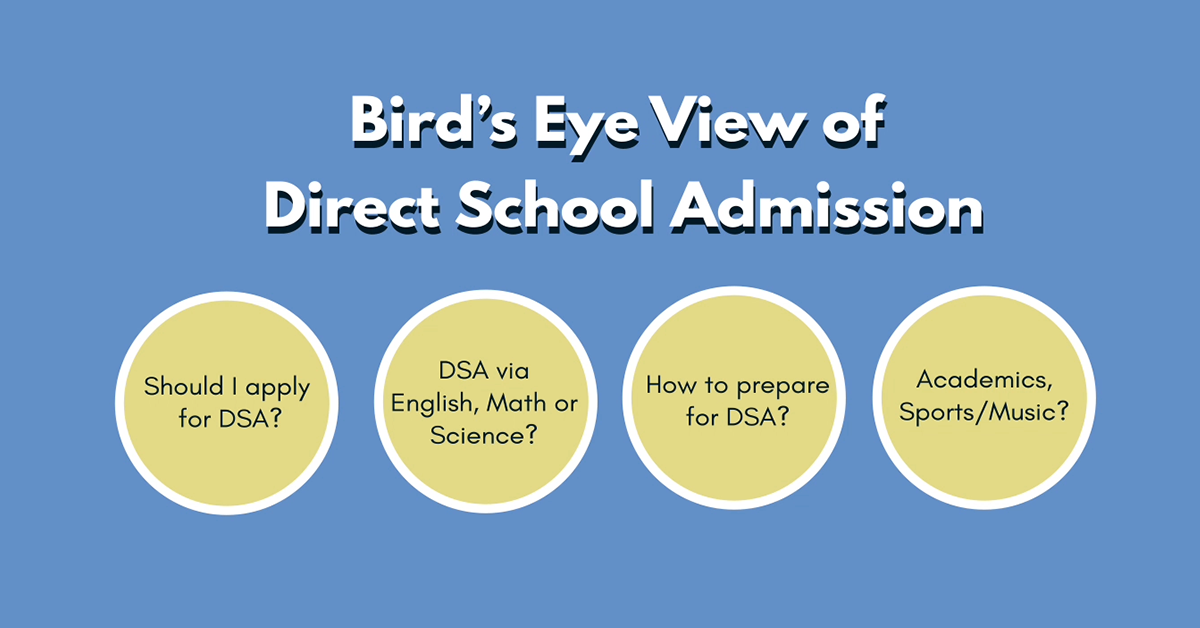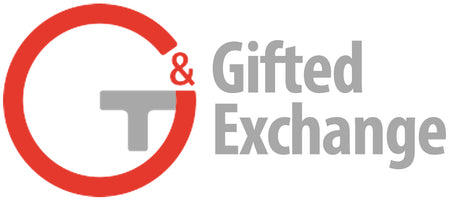
DSA Story 1: Bird’s Eye View of Direct School Admission
Started in 2004, the Direct School Admission (DSA) is a process allowing students to apply for admission to secondary schools of their choice. This is an entirely discretionary process based on the admission criteria of the school that your child has applied for.
The domains targeted for DSA are sports, music, languages and humanities, leadership, academic talent, visual arts, design and media.
What are the IP schools?Most parents will only target the top Integrated Program (IP) schools for DSA, though there are many other secondary schools that offer DSA.
IP schools offer a 6-years through train programme, bypassing O’levels. By the end of the 6th year, students will either take the A’levels or International Baccalaureate (IB), depending on what their school offers them. In NUS High School of Maths and Science, students will receive a high school diploma.
What are the top choices of DSA schools?These are some of the DSA schools:
| School | JC | Qualification Attained |
|---|---|---|
|
Hwa Chong Institution |
Hwa Chong Institution | A-Level |
| NUS High School | NUS High School | NUS High School Diploma |
| Methodist Girls’ School Anglo Chinese School (Independent) |
Anglo Chinese School (Independent) | International Baccalaureate Diploma (Dual Track Offered) |
| Dunman High School | Dunman High School | A-Level |
| Cedar Girls’ Secondary School Victoria School |
Victoria Junior College | A-Level (Dual Track Offered) |
| National Junior College | National Junior College | A-Level |
| River Valley High School | River Valley High School | A-Level |
| Temasek Junior College | Temasek Junior College | A-Level |
| St Joseph’s Institution | St Joseph’s Institution | International Baccalaureate Diploma (Dual Track Offered) |
DSA Quota increased?
Each secondary school is mandated to have a minimum quota of students admitted through DSA. This makes sure that the MOE is not merely paying lip-service to the idea of allowing students admission to secondary schools based on their non-academic merits. However, DSA to the top schools is getting more and more competitive. While the number of DSA spots has increased for all secondary schools, intake via DSA to the top schools has faced a declining trend.
What are the different domains that can be used for DSA?The DSA focuses on the child’s talents in a specific domain, or area of achievements.
Broadly, there are three fields:
1) Sports, music and art
2) Leadership
3) Academic talent
The top schools are really tough. For the sports domain, the child needs to be in his or her school team at a competitive level, have demonstrated great success and ideally have attained a national ranking.
For the music domain, students who play popular instruments such as violin and piano may face more competition. This is because more students who play these instruments will apply for DSA compared to less common instruments such as cello. If there are no vacancies, the child may not be successful in his or her application. Performances at the school orchestra or national level are highly valued as well.
What is Academic Talent? School Results?For the academic domain, academic talent does not refer to scoring well in examinations or doing well in PSLE. For Maths and Science, schools are looking for students who demonstrated exceeding potential to do well in Secondary school and have achievements in Maths or Science Olympiads.
Some schools also look for bilingual talents who can speak and use two languages with native competency. For English, students may need to have achievements such as doing well in debate and writing competitions.
Some students may be talented in the STEM field, which stands for Science, Technology, Engineering and Mathematics. With achievements in robotics and engineering projects, these students might stand a chance as well.
What are the pros and cons of DSA?Pros:
- Students with middling academic results can have an opportunity to attend some of the best secondary schools in Singapore through DSA. This is especially so for students who are very talented in one domain (such as sports), but weak at others (such as languages).
- There is less pressure for PSLE, since the students who are successful in their DSA application need to only qualify for the Express Stream.
- Late developers with special talents but just can’t do well for PSLE can benefit from DSA. For example, they may not do well in the structured PSLE science examination but yet do extremely well for NUS High School’s admission test. This is because the PSLE science examination places emphasis on memorisation of key words and phrases, which require drill and practice.
- DSA is a long-term commitment, once they have enrolled in the school, they are not allowed to change schools. For example, once they are admitted to Raffles Institution, they are not allowed to change to Hwa Chong Institution by the end of their 4th year and have to continue at Raffles Junior College.
- For students who got in through sports, music or art, they are not allowed to change their CCAs.
- Some students who go in through sports, music or art, may lag further behind academically as they are not able to cope of the academic demands of their schools.
- Students may become complacent if they receive a confirmed offer and as a result. Constant supervision and monitoring from parents may be required as some children may think that since they are going to the schools of their choice, they do not have to study anymore.
- For children who get rejected or are not able to get into the school of their choice, they may become very disheartened and feel that their talents are not being recognized.
In the next blog post, we will delve into the DSA selection process and share the top DSA interview tips. More information on building the portfolio of your child and how to prepare for DSA will be given.
Learn more about DSA programmes here.
